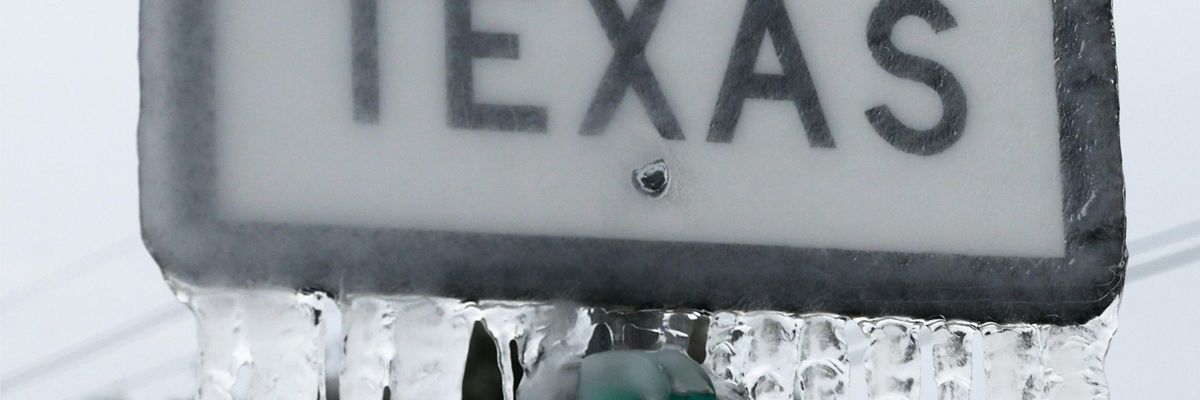New research published Friday suggests that melting Arctic sea ice caused by global heating may be responsible for the deadly deep freeze that devastated much of North America and plunged millions of Texans into darkness in February.
"Large changes in the Arctic are not just a local concern--they also have wide-ranging impacts across North America and parts of Asia."
--Judah Cohen and Mathew Barlow, study researchers
While climate researchers have previously connected the phenomena of polar heating and mid-latitute freezes, a new study published in the peer-reviewed journal Science is the first to link Arctic warming and February's cold snap. Authorities said the four-day extreme weather event--which left millions of residents trapped in sub-freezing darkness as Texas' largely independent power grid failed. State officials said the freezing temperatures killed more than 150 people in Texas, though others estimate the true death toll was likely much higher.
Polar vortices--large areas of low pressure and cold air swirling around the North and South poles--usually keep icy air contained there. However, research suggests that polar heating and ice melt fueled by the worsening climate emergency is allowing the normally trapped Arctic air to flow far southward.
Reporting on the new study, New Scientist explains:
That link still isn't fully established. However, a group led by Judah Cohen at the Massachusetts Institute of Technology found that vanishing sea ice and greater snowfall in the Arctic over the past 40 years, effects caused by climate change, may be driving cold winter weather in North America and Eurasia via the stratospheric polar vortex, the cold winds high above the pole. The rapid warming in the Arctic appears to be disrupting--that is, stretching--this vortex in a way that has a knock-on effect on atmospheric circulations above North America, generating unusually cold spells in winter.
"If you expected global warming to help you out with preparing for severe winter weather, our paper says the cautionary tale is: don't necessarily expect climate change to solve that problem for you," Cohen told New Scientist. "This is an unexpected impact from climate change that we didn't appreciate 20 years ago."
Continuing a decadeslong pattern of Texas Republicans denying the climate emergency, Gov. Greg Abbott blamed solar and wind power for February's blackouts, while calling the proposed Green New Deal "deadly" as people in his state were actually dying in darkness.
Jennifer Francis, a climate scientist at Woodwell Climate Research Center in Falmouth, Massachusetts, told the Associated Press that "the Texas cold blast of February 2021 is a poster child" for the Arctic link theory. Francis, who was not involved in the new study, said the research "takes this controversial hypothesized linkage and moves it solidly toward accepted science."
"By analyzing both observations and model simulations," Francis told New Scientist, "the conclusions are well supported and help explain how extreme cold spells like the debilitating one in Texas this past February are still likely--and perhaps more so--as the climate crisis unfolds."
Writing in The Conversation, Cohen and Mathew Barlow, two of study's five authors, conclude that "our research reinforces two crucial lessons of climate change: First, the change doesn't have to occur in your backyard to have a big effect on you. Second, the unexpected consequences can be quite severe."
"In this case, large changes in the Arctic are not just a local concern--they also have wide-ranging impacts across North America and parts of Asia," they note. "And those impacts are not always what people are expecting. The results highlight another reason to rapidly reduce the greenhouse gas emissions that are driving global warming and at the same time the need to develop better strategies for managing extreme weather events, both hot and cold."




